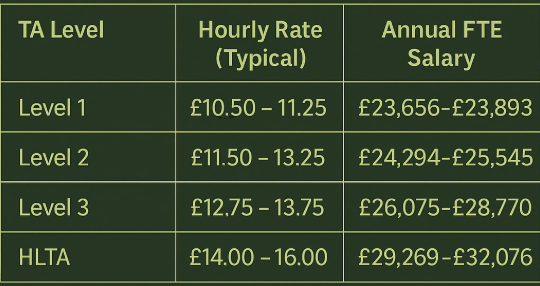No products in the cart.
Let’s stop pretending. Teaching assistants aren’t just helping out in schools. They’re holding the system together. They calm the chaos. They run reading groups. They soothe meltdowns. They support the most vulnerable kids—often with no training, no warning, and no break. So here’s the question: how much do teachers assistants get paid per hour in the UK?
Get ready. Because the answer might shock you.
The Straight-Up Numbers
Let’s cut the fluff. As of 2025, the average hourly rate for a teaching assistant in the UK falls between £10.50 and £13.50. That range depends on:
- Where you live
- What level you’re working at
- Your experience
- Your contract (term-time or full-year)
If you’re in London, you might earn closer to £14 or even £15 an hour. If you’re in the North or rural areas, it could be closer to £11. Some TAs earn less. Some earn more. But most sit right there in the middle.
In simple terms, how much do teaching assistants earn per hour comes down to how your school values your skills—and how much responsibility they give you.
Full-Time Pay? Don’t Be Fooled
Most TAs are not full-time in the way most people think. You work school hours—maybe 8:30 to 3:30. You work term-time only—usually 39 weeks a year. Some contracts include paid holidays. Most don’t.
So that £13 an hour? That’s not 40 hours a week for 52 weeks. It’s more like:
- 30 hours a week
- For 39 weeks
- Paid pro-rata
In plain terms? That’s around £13,000 to £17,000 per year, after tax. For a job that demands patience, skill, and serious emotional strength.
Pay by Level: The Hidden Ladder
Most schools now link pay to levels. Here’s how it breaks down in 2025:

Again, these are full-time equivalent (FTE) salaries. You only get the full amount if you work year-round with no unpaid breaks. Most TAs don’t. Which means the take-home number stays low—even when your work gets harder.
London Weighting? Yes, But Not For Everyone
Live in Inner London? Great. You might earn more—up to £3,000 more per year. That bumps up your hourly pay. But the cost of living in London eats most of it.
In Outer London or fringe areas, the extra money shrinks. Some schools in expensive towns don’t offer any uplift at all. You get national rates, even if rent costs triple the national average.
So don’t assume “London” means more money in your pocket. Ask first. Always.
Wait—Why So Low?
Simple. The government still sees teaching assistants as support. Not specialists. Not professionals. Just support. Even though TAs now:
- Run learning sessions
- Track pupil progress
- Handle behaviour plans
- Manage classroom tech
- Comfort children in distress
- Cover classes when teachers are out
You do all that. But the pay still sticks at the bottom of the public sector scale. Many TAs earn less per hour than a supermarket assistant. No shade to retail workers. But think about that. You guide young people through learning—and earn less than someone scanning groceries.
Does the Role Deserve More?
Yes. And everyone knows it.
In 2025, unions like UNISON and NEU are demanding:
- A flat £3,000 pay rise for all school support staff
- National minimum hourly pay linked to living wage levels
- Recognition for SEN and cover duties
- Guaranteed annual reviews for all TA contracts
Most heads agree. They know the school falls apart without strong TAs. But school budgets are tight. So change has to come from higher up.
The Truth About Job Ads
If you’re job hunting, here’s what you’ll see:
“Exciting opportunity to join our supportive team!”
“Term-time only—perfect for work-life balance!”
“Competitive pay offered (depending on experience)!”
Sounds nice, right? But scroll down. You’ll often find:
- £11.20 per hour for 30 hours a week
- Fixed term, reviewed yearly
- No guaranteed training
- No pay scale listed
And remember—“term-time only” often means unpaid holidays. So when the school closes, your pay does too.
Extra Duties, No Extra Pay
This one stings. You might get asked to:
- Lead a class without a teacher
- Run a parent meeting
- Supervise lunchtime duty
- Mentor a trainee TA
- Manage a medical care plan
Do those count as Level 3 work? Probably. Will your pay go up? Not unless you ask. Loudly. Some TAs do Level 3 work on Level 1 pay—for years. Why? Because schools don’t always review contracts. And many TAs don’t know what the levels mean.
If you’re doing more, push for more. You have every right to ask where your job fits on the scale.
Is It Worth Staying?
That depends.
If you love helping children learn, it’s hard to walk away. If your team backs you, and your school respects your work, it can feel like a dream job. But money matters. Many TAs leave for better-paid roles in early years or adult care. Some move to admin. Others train as teachers or HLTA.
If you’re staying, make it count. Get the training. Know your level. Log your impact. Push for what you’re worth.
Want to Earn More? Here’s What Helps
Here’s what increases your hourly pay as a TA:
- Level 3 qualification – essential for senior roles
- HLTA status – lets you lead classes short-term
- SEN specialism – schools often pay more for this
- Cover supervision – some pay extra if you’re left in charge
- London location – but only if the school offers the uplift
The best move? Get qualified. A Level 3 TA earns around £2 more per hour than Level 1. That adds up to over £2,000 a year—even on a term-time contract.
Could You Switch to Teaching?
If you’re ready to lead a class full-time, it might be time to train. And no—you don’t always need a degree first.
As of 2025, you can apply for:
Teacher Degree Apprenticeships
Work in school. Study one day a week. Earn while you learn. After four years, you’ll get:
- A full degree
- Qualified Teacher Status (QTS)
- No student debt
Your hourly rate will jump once you qualify. Most NQTs earn over £17 per hour (full-time). That’s a big step up.
Part-Time Teaching Degrees
Some TAs choose this route. You study evenings or weekends while working. It takes longer. But it’s flexible. And the school might support you.
Either way—you move out of the support band and into a qualified teaching role. And your hourly pay reflects that.
Still Love the TA Role? Aim for HLTA
You don’t have to become a teacher to grow. The Higher Level Teaching Assistant (HLTA) route gives you more leadership, more respect, and more money—without leaving your TA roots. HLTAs in 2025 earn between £14 and £16 per hour, depending on location. That’s a big jump from Level 1. And schools love having strong HLTAs they can trust.
If you already lead groups, cover lessons, or support behaviour plans—you’re probably doing HLTA-level work. Ask your school if they’ll back your training.
What Needs to Change
Let’s be bold. Let’s say it loud.
TAs deserve:
- Fair hourly pay for the work they do
- Clear job descriptions linked to levels
- Paid training during school hours
- Real contracts—not year-by-year reviews
- A national TA pay structure backed by law
Until that happens, it’s up to you to ask. To check your contract. To speak to your rep. To tell your school what you’re really doing. You’re not “just” a teaching assistant. You’re a frontline educator. Your hourly rate should reflect that.
Final Word: Know Your Worth, Then Fight for It
So—how much do teachers assistants get paid per hour in the UK?
Too little for what they do. But not too little to speak up about it. Whether you’re on £10.50 or £13.50 an hour, your role matters. You guide children. You support teachers. You help whole classes stay on track. Now it’s time to guide your career.
If you’re working above your level—ask for a review.
If you want to move up—get the training.
If you want to teach—start the journey.
And if you just want to be paid what you’re worth—don’t be quiet.
Be bold. Be clear. Be loud.
You’ve earned it. Ready to earn in education? Explore our online Teaching Assistant Course at Wise Campus and gain valuable skills!






